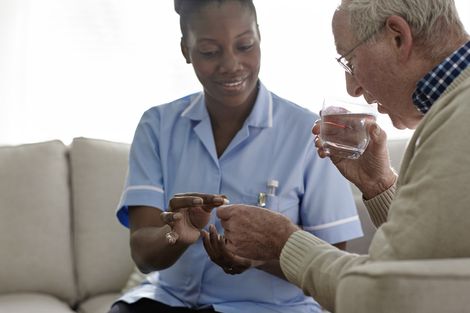Striving to improve acceptability and compliance of medicines in the most vulnerable patient groups, particularly children and the elderly.

Pioneering Taste Acceptability For All
Gustoceutics provides a biosensor taste testing service to improve acceptability and compliance of medicines for the most vulnerable patient groups, particularly children and the elderly.
We are passionate about helping medicine developers optimise their formulation development to achieve the goal of improving acceptability for all members of society.
Why Gustoceutics?
Based at UCL School of Pharmacy, Professor Duncan Craig and Dr Hend Abdelhakim have worked together for a number of years developing and testing paediatric dosage forms, including in-vitro taste assessment studies of raw pharmaceutical entities as well as formulated dosage forms.
The work they have undertaken has assisted companies to move forward with their medicine design and optimisation, based on a rapid quantitative assessment of both drug and formulation taste assessment.


Services
We currently use an electronic tasting system or 'E- tongue' for taste-assessment of drugs and formulations, providing the clients with comprehensive statistical analysis and benchmarking against known bitter drugs.
Using this information, we assign the drug a bitterness threshold that can be used to estimate the aversiveness expected from the clinical dose planned.
We work with clients to optimise drug taste-masking by giving a breakdown for the taste profile of the samples as well as offering formulation strategies.
As well as assessing the taste of drugs, we help clients understand the effects of the excipients added on the overall taste profile of the medicine.
Once formulated, we use our expertise to help clients de-select formulations and make informed decisions about progressing formulation candidates.
In addition, we can advise on
age-appropriate dosage
forms especially with regards to ease of swallowing and handling in various age groups.
Taste Assessment
Currently Gustoceutics uses the ɑ-Insent TS-5000Z E-Tongue which is based on potentiometric measurement principles to assess the taste of substances as compared to a reference.
Taste qualities that can be detected include salty, sweet, sour, umami, bitter and astringent. We usually focus on assessing bitterness and astringency as they are known to be the cause of pharmaceutical aversiveness in patients.
A good correlation between E-Tongue generated bitterness scores and those from a human taste panel was established for ten of the most commonly used bitter drugs*, lending credibility to the technique especially in early stages of formulation development.
* Kobayashi, Y.& Ikezakj, H. Biochemical sensors:
Mimicking gustatory and olfactory senses.
(Pan Stranford Publishing, 2013).

Further Information
To find out more, please get in touch discuss how Gustoceutics can support your formulation development journey.
info@gustoceutics.com



Key References
Chay, S. K. et al. (2018) 'Evaluation of the taste-masking effects of (2- hydroxypropyl)-b-cyclodextrin on ranitidine hydrochloride; a combined biosensor, spectroscopic and molecular modelling assessment', RSC Advances.
Abdelhakim, H. E. et al. (2019) 'Electrospinning Optimization of Eudragit E PO with and without Chlorpheniramine Maleate Using a Design of Experiment Approach', Molecular Pharmaceutics.
Ekweremadu, C. S. et al. (2020) 'Development and evaluation of feline tailored amlodipine besylate mini-tablets using L-lysine as a candidate flavouring agent', Pharmaceutics.
Tawfik, E. A. et al. (2021) 'A Potential Alternative Orodispersible Formulation
to Prednisolone Sodium Phosphate Orally Disintergrating Tablets', Pharmaceutics.
Abdelhakim, H. E. et al. (2021) 'Utilising co-axial electrospinning as a taste-masking technology for paediatric drug delivery', Pharmaceutics.


